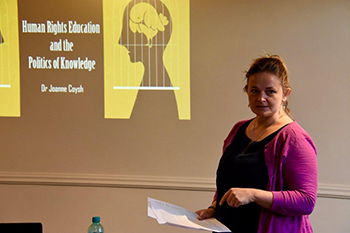Latest News Archive
Please select Category, Year, and then Month to display items
11 September 2024
|
Story Anthony Mthembu
|
Photo Anthony Mthembu and Chelsea Carolus
 From the left: Geraldine Lengau, Senior Officer in the Unit for Institutional Change at the UFS; and Oratile Reina, West College Prime.
From the left: Geraldine Lengau, Senior Officer in the Unit for Institutional Change at the UFS; and Oratile Reina, West College Prime.
As part of the initiatives lined up for College Week, the student leaders of West College at the University of the Free State (UFS) hosted a dialogue that primarily focused on discussing social justice as a value of Vision 130. The dialogue was held at Outeniqua Residence on 3 September 2024 and was well attended by students within West College.
According to Oratile Reina, West College Prime, “the motivation for the dialogue was to prepare newly elected leaders and our college community to align their efforts with Vision 130 – a vision that aims to create a more inclusive, equitable, and socially just environment on campus”. As such, she highlights that the dialogue was an opportunity for leaders to discuss practical strategies for implementing these values in their respective spaces, and to encourage those in West College to become better citizens inside and outside the university.
A conversation on social justice
The dialogue was facilitated by Geraldine Lengau, Senior Officer in the Unit for Institutional Change and Social Justice at the UFS. Lengau touched on several aspects pertaining to the topic of discussion. Firstly, she allowed the audience to give their definition of social justice, especially as students within the institution. In addition, she went on to talk to the audience about sexual assault in the context of social justice. In this instance, Lengau gauged whether the students knew which processes to follow in the event of a sexual assault incident, and whether they were acquainted with the UFS Sexual Harassment, Sexual Misconduct, and Sexual Violence Policy. Furthermore, the audience was given the opportunity to outline what social justice looks like to them in the spaces they occupy, including in their respective faculties, the sports they play, and the leadership structures they form part of. “I was encouraged to see that students take their right to a socially just university in very high regard, and that they were willing to break it down from what Vision 130 proposes, in order to align it with their common understanding,” said Lengau.
As the dialogue concluded, the audience signed a pledge committing to uphold the values of Vision 130. According to Reina, “The pledge represents a promise to take concrete steps towards fostering an inclusive and equitable campus culture. By signing the pledge, the leaders are not only agreeing to embody these principles in their leadership roles but are also holding themselves accountable to their peers and the broader university community.”
IRSJ Research Fellow promotes human rights transformation
2017-10-05

Dr Joanne Coysh and Dr Sahar Sattarzadeh attend the
launch of Human Rights Education and
the Politics of Knowledge.
Photo: Luis Escobedo D’Angles
Dr Joanne Coysh is a multi-talented individual who has designed, facilitated, and accompanied participatory processes for research, learning, and change. She is also a postdoctoral research fellow from the University of Warwick, in the UK, and is working at the Institute for Reconciliation and Social Justice (IRSJ) at the UFS. Dr Coysh’s book, Human Rights Education and the Politics of Knowledge, was launched at the Centenary Complex on the Bloemfontein Campus by the IRSJ on 15 August 2017.
Connecting theory with practice
In the book, she argues that the traditional ways in which human rights education is conducted often become an obstacle. Based on her work on participatory group processes, Dr Coysh is uniquely positioned to bring a different and more practical, even radical, angle to the process of human rights education. Her purpose with the book is to connect theory to practice in order to design processes through which people begin to take positive and transformative decisions and actions. These not only have the potential to transform lives but our relationships with each other and the world in which we live as well.
Teaching and learning from the bottom up
When working with individuals and groups, Dr Coysh believes that they should be engaged, enabled, and empowered throughout the process. Not only does she explore real problems in context, but when doing her work, she also believes in encouraging respect for existing research and knowledge.
Her international experience in education and working in communities has allowed her to integrate global best practices into local application, allowing her to explore the big picture as well as local context. Having mastered the art of balancing theory with practice, research with reality, and facilitation with integration, her book shows how this dance can turn human rights education into human rights transformation.